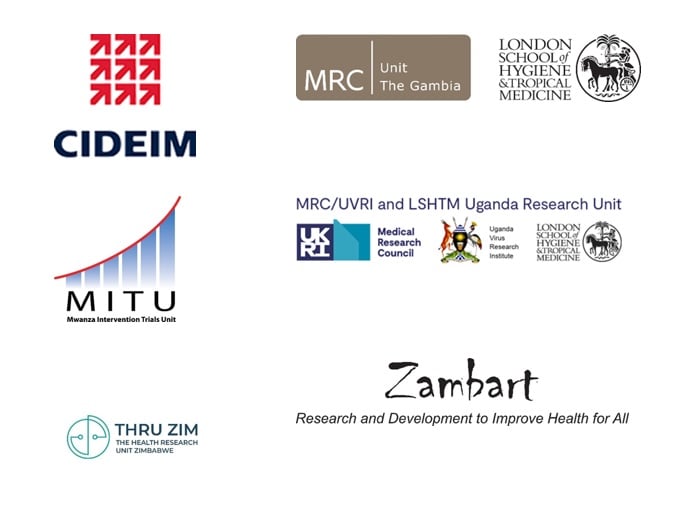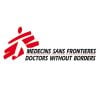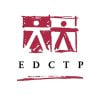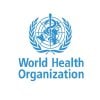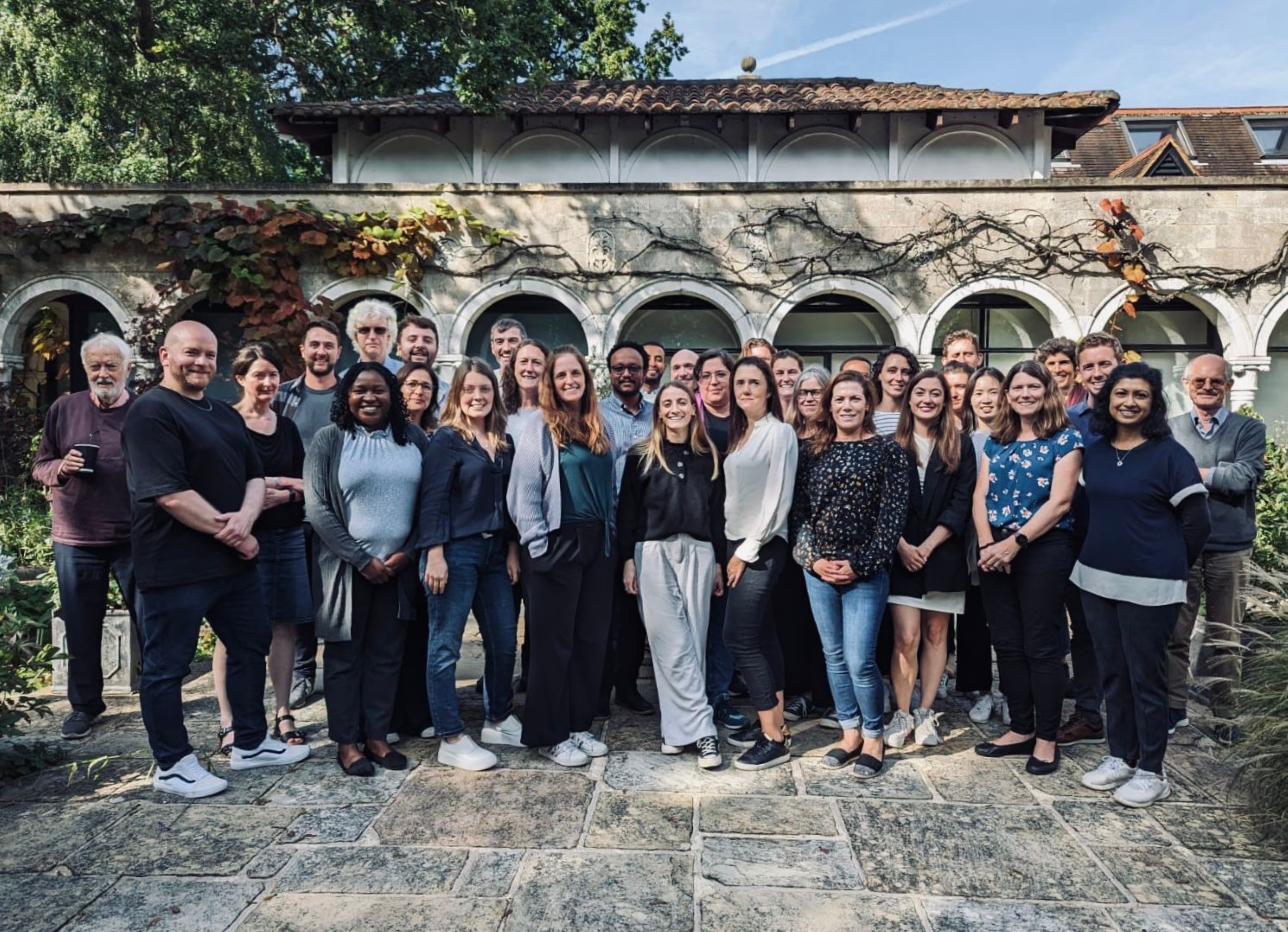
ISEG
International Statistics and Epidemiology Group
Collaborating with international research partners to improve health in low and middle-income countries.
The mission of the International Statistics and Epidemiology Group (ISEG) is to improve health in low- and middle-income countries (LMICs) by conducting research that identifies and evaluates effective interventions
Recent updates
Events
Newsletter
Contact us

The International Statistics and Epidemiology Group (ISEG) led by Professor Helen Weiss, is based within the Department of Infectious Disease Epidemiology. The Group was established in 1972 and now comprises 34 statisticians and epidemiologists with a research portfolio of over 30 grants. We conduct studies on the epidemiology and control of major public health problems of low and middle income countries, with a major focus on HIV, tuberculosis, malaria, and emerging and neglected diseases, and a special emphasis on intervention studies. The Group’s research is largely based in Africa and Asia.
Below are a few recent examples of where our work has had a significant impact on health policy and practice:
- A large-scale stepped wedge trial of seasonal malaria chemoprevention (SMC) in Senegal which established its safety and effectiveness at scale, with administration of ~1 million antimalarial courses
- The ZAMSTAR trial in southern Africa which found that household interventions were associated with a reduction in TB prevalence and transmission
- The REMSTART trial in Tanzania and Zambia which found that screening & pre-emptive treatment for cryptococcal infection in people living with HIV combined with a short period of adherence support substantially reduces mortality
- The HPTN 071 (PopART) trial to evaluate the impact of a universal test-and-treat intervention on population-level HIV incidence in southern Africa which has found substantial increases in the coverage of HIV testing and treatment after just one year of the community-wide intervention
- The Oflotub study of a 4-month gatifloxacin-containing regimen vs. standard 6-month treatment for drug sensitive TB which showed the shorter regimen was safe but failed to demonstrate non-inferiority
- Three randomised controlled trials (RCTs) in India and Zimbabwe which showed that trained lay counsellors can treat depression, anxiety and alcohol use disorders effectively and cost-effectively
- Rapid-response studies of the Ebola virus disease (EVD) outbreak, including a trial to assess the efficacy and safety of convalescent plasma for the treatment of EVD in Guinea
Group members also have an active role in international technical and policy advisory groups to ensure that results from our studies are used to influence global policy, governance and guidelines.
Lancet profile MRC Network article
History
Historical Overview of ISEG’s Global Impact and Future Challenges
Since 1972, ISEG has been involved in state-of-the-art intervention research in developing countries across an expansive range of research areas, including malaria, HIV, TB, vaccine-related diseases, maternal, neonatal and child health, non-communicable diseases, and methodology of cluster RCTs.

- Key collaborating institutes

Mwanza Intervention Trials Unit, Tanzania
We collaborate on statistics with multiple researchers, including the MRC/LSHTM research units in Uganda, The Gambia and the Mwanza Intervention Trials Unit (MITU), in Tanzania. This includes providing expertise on the design and conduct of studies, advising and mentoring locally employed statisticians and epidemiologists, collaborating with Unit researchers, and teaching on Unit training courses in epidemiology, statistics and research methods.
We have also helped to create a clinical trials data centre at the Kenya Medical Research Institute, Nairobi, competent in GCP-compliant data management systems and electronic data capture.

MRC Field Station Basse, The Gambia and MRC/UVRI Uganda research Unit on AIDS.
Recent updates
Events
Newsletter
Contact us

Emily
Webb
Professor of Medical Statistics and Epidemiology
Professor in Medical Statistics and Epidemiology and Director of International Statistics & Epidemiology Group

Miriam
Abdulla
Research Fellow

Neal
Alexander
Professor of Medical Statistics and Epidemiology

Sanni
Ali
Assistant Professor - Medical Statistics
Elizabeth
Allen
Professor of Medical Statistics
Philip
Ayieko
Assistant Professor

Kathy
Baisley
Associate Professor

Emma
Beaumont
Research Fellow

Joe
Biggs
Research Fellow in Epidemiology

Christian
Bottomley
Professor in Medical Statistics

John
Bradley
Professor of Medical Statistics and Epidemiology

Daniel Carter
Research Fellow

Jackie
Cook
Professor of Infectious Disease Epidemiology

Aoife
Doyle
Associate Professor

Chido
Dziva Chikwari
Assistant Professor

Tansy
Edwards
Associate Professor

Katherine
Fielding
Professor

Sian
Floyd
Professor of Medical Statistics and Epidemiology

Ari
Fogelson
Research Fellow

Thomas
Gachie
Research Assistant in Medical Statistics and Epidemiology

Daniel
Grint
Associate Professor
Chris
Grundy
Associate Professor

Sarah
Harman
Research Programme Manager

Richard
Hayes
Emeritus Professor of Epidemiology & International Health

Jack
Howlett
Project Coordinator

Saidi Kapiga
Non-clinical Reader

Pally Khan
Clinical Research Fellow

Zofia
Kicinova
Project Coordinator

Min
Kim
Research Fellow

David
Macleod
Associate Professor
Paul
Milligan
Professor of Medical Statistics and Epidemiology
Nuredin
Mohammed
Associate Professor
Marisa
Muckian
Research Fellow

Melissa
Neuman
Associate Professor

Emily
Nightingale
Assistant Professor

Eugene
Ruzagira
Associate Professor

Kalpana
Sabapathy
Clinical Assistant Professor - (HCC)
Albertus
Schaap
Research Fellow

Joanna
Schellenberg
Professor of Epidemiology and International Health

Susana
Scott
Associate Professor

Colette
Sih
Research Fellow in Epidemiology

Vicky
Simms
Associate Professor

Peter
Smith
Professor of Tropical Epidemiology

Paul
Snell
Data Manager

Helen
Stagg
Professor of Infectious Disease Epidemiology
Joanna
Sturgess
Research Fellow

Amare
Tadesse
Assistant Professor
Clare
Tanton
Assistant Professor in Epidemiology

Jennifer
Thompson
Assistant Professor

Helen
Weiss
Professor of Epidemiology
Recent updates
Events
Newsletter
Contact us
Research degree students
- Studies ongoing
PhD Student Supervisor Dissertation title Abdullahi Ahmed Umberto D'Allesandro/John Bradley TBC Agnes Natukunda Emily Webb/Alison Elliott Statistical modelling of vaccine responses among Ugandan adolescents Arthi Vasantharoopan Vicky Simms The economic impact of HIV on children and adolescents in Zimbabwe Camille Wittesaele Aoife Doyle/Helen Weiss Understanding access to essential child healthcare services among children of adolescent mothers in the Eastern Cape, South Africa Cara O'Connor Aoife Doyle Mobile phone adherence support for HIV patients in Manila, Philippines Charles Cleland Covadonga Bascaran/Dave Macleod/Matthew Burton Artificial Intelligence-Supported Diabetic Retinopathy Screening in Tanzania Chelsea Major Neal Alexander Cohort study of COVID-19 community transmission dynamics, preventive behaviours, and outcomes in Puerto Rico Christina Easter Jennifer Thompson Risks of bias in the stepped-wedge cluster randomised trial Claire Calderwood Katherine Fielding Integrated multi-component health checks for TB-affected households (IMBA Hutano) Emma Radovich Christian Bottomley The continuum of care for maternal, newborn and child health Esther Nasuuna Helen Weiss/Laurie Tomlinson/Chido Dziva Chikwari The Epidemiology of Chronic Kidney Disease among Young People Living with HIV in Uganda. Eun Seok Kim Kalpana Sabapathy/Emily Webb Risk factors for hookworm persistence, and impact of fatty meal co-administration and dual-dosing on albendazole effectiveness among school-aged children against hookworm in Mayuge district of Uganda Farrie Nzvere Aoife Doyle / Vicky Simms TBC Georgia Gore-Langton Matt Chico/John Bradley Malaria and curable STI/RTIs Godfather Kimaro Christian Bottomley Economic evaluation of the REMSTART trial Godfrey Kisigo Saidi Kapiga/Kathy Baisley/Rob Peck TBC Harry Hutchins Anna Last/Chris Drakeley/John Bradley Evaluating the impact of DP and IVM MDA on the transmission of malaria and co-endemic NTDs on the Bijagos Archipelago, Guinea-Bissau Isaac Sekitoleko Emily Webb/Moffat Nyirenda The use of advanced statistical methods to assess survival and disease progression among participants with COPD in LMICs Isabel Byrne Chris Drakeley / Jackie Cook TBC Jessica Gross Rashida Ferrand/Dave Macleod Pediatric HIV Testing: Expanding access to innovative options, testing for high-risk children, and a strategic mix of services across national programs Laura Lunani Mitzy Gafos / Melissa Neuman Evaluating factors influencing preferences for current and future use of multipurpose and HIV preventive technologies among women at risk aged 15-45 years in
Nairobi and KampalaLily Telisinghe Helen Ayles/Richard Hayes Can universal testing and treatment for HIV and community-wide active case finding for tuberculosis control the African tuberculosis epidemic Ludoviko Zirimenya Alison Elliott/Emily Webb Investigating the impact of malaria and BCG revaccination on vaccine responses and susceptibility to SARS CoV-2 infection in African adolescents Madalo Mukoka Katherine Fielding Using social network approaches to optimize efficient delivery of Public Health interventions: Application to HIV and schistosomiasis services via the FISH cluster randomized trial in Malawi Mamtuti Panneh Tara Beatie/John Bradley/Mitzy Gafos Cortisol Levels in Relation to Violence Exposure, Mental Health Disorders, and Systemic Inflammation among Female Sex Workers in Nairobi, Kenya: a Longitudinal Cohort Study Marjorie Pichon Melissa Neuman / Ana Buller Soto Processes of diffusion of the LINEA intervention to prevent age-disparate transactional sex in Mwanza, Tanzania Mark Otiende Christian Bottomley The impact of PCV on mortality in The Gambia Matthew Dodd Jennifer Thompson Issues around the definition of compliance in complex, non-inferiority trials Michaela Takawira Aoife Doyle TBC Min Kim Dave Macleod/David Prieto/Jennifer Nicholas Can pragmatic adaptive trial designs provide high quality evidence and methodology for implementing CI into public health programmes? Nyasha Dzavakwa Vicky Simms Treatment adherence in young people living with HIV using an electronic monitoring device in Harare, Zimbabwe Olukayode Odufuwa John Bradley Factors associated with hypertension, hypertension control and adherence to hypertension treatment and lifestyle modifications in rural Lusaka Rebecca Prah Giulia Greco/Helen Weiss Measuring and valuing outcomes for the economic evaluation of a school-based menstrual health intervention for adolescents in Uganda Robinah Nalwanga Emily Webb/Caroline Trotter Modeling integrated strategies to optimise vaccine impact among vulnerable populations in Uganda and Kenya Sheila Kansiime Richard Hayes/Christian Hansen/Eugene Ruzagira Using statistical and epidemiological methods to address challenges in the design of HIV prevention intervention studies, in the era of highly effective pre-exposure prophylaxis Sonali Nayantara Wijayanandana Neal Alexander/Christian Bottomley Evaluating the effect of population movements on dengue transmission dynamics in Sri Lanka Stacie Shelton Helen Weiss/Aoife Doyle Measuring and valuing outcomes for the economic evaluation of a school-based menstrual health intervention for adolescents in Uganda Suzanne Keddie John Bradley/Ruth Keogh/Oliver Baerenbold Bayesian estimation of the aetiology of fever using big case-control data Tafadzwa Madanhire Nuredin Mohammed Mechanistic understanding of vitamin D, calcium, and bone metabolism during adolescent skeletal growth in children living with HIV Zacchaeus Anywaine Alison Elliott / Christian Hansen Rift valley fever immune-epidemiology and vaccine development among human populations in Uganda - Studies completed
Abdoulie Bojang Christian Bottomley Impact of giving azithromycin during labour on the prevalence of resistance in staphylococcus aureus Abubaker Lule Emily Webb Investigating the impact of early-life, life-course and genetic factors on blood pressure among young Africans Aderonke Adepeju Odutola Christian Bottomley Epidemiology of staphylococcus aureus in The Gambia Alasdair Cook Simon Cousens Control of salmonella infection in pigs at the farm level in Great Britain Amadou Jallow Vicky Simms Incidence and cost of hip fracture in The Gambia Amy Sturt Amaya Bustinduy/Emily Webb/Suzanna Francis The cervicovaginal environment and HIV incidence in Zambian women with female genital schistosomiasis Anatoli Kamali Richard Hayes Research on the epidemiology and prevention of HIV in rural South West Uganda, 1989-2010 Andrew Abaasa Stephen Nash/Jim Todd/Pontiano Kaleebu Using observational cohort data from key populations to plan HIV intervention studies Anita Ramesh Neal Alexander The role of residential proximity to public and private water sources in lymphatic filariasis Anthony Ngugi Immo Kleinschmidt Prevalence, incidence and mortality of epilepsy in four health and demographic surveillance sites in Sub-Saharan Africa Augustine Choko Katherine Fielding Partner-provided HIV Self-Testing and Linkage (PASTAL) in antenatal care clinics: methodology and delivery of an adaptive cluster-randomised trial in Blantyre, Malawi Benson Droti David Ross/Janet Seeley Availability of health care for older persons in primary care facilities in Uganda Chido Dziva Chikwari Vicky Simms Index-linked community based HIV testing for adolescents in Zimbabwe Christian Kositz Michael Marks/John Bradley Investigating the effects of ivermectin plus dihydroartemisinin-piperaquine MDA on the transmission of malaria by measuring serological markers of exposure and its effects on the prevalence of ectoparasites and soil transmitted helminths Clare Tanton Helen Weiss Effect of herpes suppressive therapy (HSV) on genital shedding of HIV among women at high risk in Tanzania Claudia Hanson Joanna Schellenberg The epidemiology of maternal mortality in Southern Tanzania Cynthia Kahari Andrea Rehman The effect of HIV and its treatment on trabecular and cortical bone architecture in children, adolescents and premenopausal women David Katende Heiner Grosskurth/Kathy Baisley/Moffat Nyirenda Investigating the Medium to Long term Sustainability of an Intervention to Improve care for Hypertension and Diabetes within the Primary Health Care setting in Uganda Elaine Flores Vicky Simms Adaptation and accessibility of an intervention to promote social capital and improve mental health in a post-El Nino Southern Oscillation (ENSO) context in Peru Elhadji Ba Paul Milligan Inequalities in child survival in a rural area of Senegal where malaria incidence has declined Eliud Lukole Jackie Cook/Immo Kleinschmidt/Natacha Protopopoff Evaluation of next-generation bed nets in a cluster randomised trial in Tanzania Erin Anastasi (DrPH) Sian Floyd Between women’s use of antenatal care and skilled birth attendance? A case study in Northern Uganda Eugene Ruzagira Heiner Grosskurth Effect of counselling on linkage to HIV care after home-based HIV testing in rural Uganda: An intervention study Fariayi Nyakoko Kate Ward/Andrea Rehman Comparing the skeletal maturity of children and adolescents from three Sub-Saharan African countries and assessing the impact of HIV on skeletal maturity Fiona Cresswell Daniel Grint/Alison Elliot Improving the diagnosis and treatment of HIV-associated tuberculous meningitis Ghina Mumtaz Helen Weiss The epidemiology of HIV infection among high-risk populations in the Middle East and North Africa Giorgia Gon Stephen Nash Birth attendants’ hand hygiene in maternity wards in low-resource settings: levels and drivers Grazia Caleo Helen Weiss Epidemiology and control of Ebola virus disease (EVD) in Sierra Leone Gregory Kabadi Joanna Schellenberg Towards a new method for evaluating national maternal health programmes in Tanzania: measuring implementation strength of focused antenatal care and emergency obstetric care Hannah Rickman Katherine Fielding Heterogeneity in IGRA-based Mycobacterium tuberculosis immunoreactivity in urban Malawi: revisiting surveillance needs to End TB Helen Mebrahtu Vicky Simms The impact of HIV on child cognitive development - a study in Zimbabwe Henry Surenda Jackie Cook/Chris Drakeley Operational applications of serology for malaria surveillance in different transmission settings in Indonesia Hiam Chemiatally Helen Weiss Characterising HIV epidemiology among female sex workers and their clients in the Middle East and North Africa region Imran Morhasen-Bello Suzanna Francis The epidemiology of, and risk factors for oro-genital and anal human papillomavirus infections among sexually active Nigerians: A mixed methods study Intira Collins Shabbar Jaffar Outcomes and cost-effectiveness of anti retroviral treatment in HIV-affected children in Thailand Ivan Kasamba Helen Weiss Epidemiology and prevention of HIV in a cohort of women involved in high risk sexual behaviour in Kampala, Uganda Jacqueline Lim Neal Alexander Assessment of the undocumented burden of dengue in Africa Jennifer Thompson Katherine Fielding Statistical design and analysis of cluster-randomised stepped wedge trials Joel Francis Heiner Grosskurth/Helen Weiss The epidemiology of alcohol use among young people in Tanzania John Hustedt Neal Alexander Implementing integrated vector control to better control dengue transmission Joshua Mendelsohn David Ross Is forced displacement a barrier to acceptable treatment outcomes among refugees on antiretroviral therapy? A field study in Malaysia and Kenya Joyce Der Daniel Grint Pathways to tuberculosis diagnosis and treatment in Ghana: identifying the gaps and seeking solutions Kalpana Sabapathy Richard Hayes Factors associated with uptake of key interventions along the cascade of care in the HPTN 071 (PopART) trial Karen Myllynen Webb Melissa Neuman Increasing uptake of intrapartum and early postnatal services among rural Zimbabwean women in a high HIV prevalence context Kate Sabot Joanna Schellenberg The use of social network analysis to study health care provider advice and performance Laura Ferguson David Ross Linking women who test HIV-positive in pregnancy-related services to HIV care and treatment services in Kenya: missed opportunities Lawrence Lubyayi Jonathan Levin/Emily Webb/Alison Elliot Statistical modeling approaches for longitudinal multiple outcome data from immuno-epidemiological studies in Entebbe, Uganda Linda Sande Melissa Neuman Uptake of facility-based delivery and early infant HIV diagnosis in a high HIV-prevalence context Lindsey Wu Immo Kleinschmidt Measures of malaria transmission to inform the design and evaluation of cluster randomised trials for transmission blocking vaccines Lizzie Chappell Kathy Baisley The cascade of care for HIV-exposed infants in rural South Africa Lori Miller Richard Hayes Without directly observed sex, what's a microbicide trialist to do? Adherence and adherence measurement as a clinical trial design issue in vaginal microbicide trials for HIV prevention Mandijudza Tembo Constance Mackworth-Young/Helen Weiss Menstrual health: investigating the acceptibility, uptake, and effectiveness of a menstrual health management intervention within a community-based sexual and reproductive health program among young women in Zimbabwe Margaret Thembo James Lewis/Helen Ayles Factors associated with hypertension, hypertension control and adherence to hypertension treatment and lifestyle modifications in rural Lusaka Meenakshi Gautham Helen Weiss Quality of care for reproductive tract morbidities by rural providers in North India Michael Wallace Simon Cousens Facilitating correction for classical covariate measurement error Mohammed Limbada Dave Macleod A comparison of different community models of antiretroviral therapy delivery among stable HIV+ patients in an urban setting, Zambia Monica Kuteesa Emily Webb/Janet Seeley Epidemiology of alcohol misuse and illicit drug use, and their association with HIV among occupational groups at high-risk of HIV in Sub-Saharan Africa Mzembe Themba Kathy Baisley/Alison Grant Prevalence of mycobacterium tuberculosis infection among adolescents in rural KwaZulu-Natal, South Africa Ngozi Kalu Melissa Neuman Community voices: HIV AIDS field diaries in Nigeria Pamela Muniina Sian Floyd Household survival and changes in characteristics of households in rural South-Western Uganda through the period of 1989 to 2008 Peter Horby Neal Alexander Avian, inter-pandemic, and pandemic influenza in Vietnam Philippa West Immo Kleinschmidt Investigating the complementary use of two malaria vector control methods: A cluster randomised control trial in Northwest Tanzania Pitchaya Indravudh Katherine Fielding Evaluation of community-led delivery of HIV self-testing kits in Malawi Rebecca Geary Emily Webb Youth-friendly health services: a critical investigation of provision and young people’s experiences in South Africa Richard Sanya Emily Webb/Alison Elliott/Irene Biraro Helminths and metabolic outcomes in rural and urban Uganda Ronnie Kasirye Heiner Grosskurth/Kathy Baisley Whether to stop or continue cotrimoxazole in HIV affected adults on ART Rudo Chingono Vicky Simms The impact of a comprehensive parenting intervention addressing early childhood stimulation, economic resilience and HIV care on the maternal mental health of HIV infected mothers in Zimbabwe Ruramayi Rukuni Rashida Ferrand/Andrea Rehman The IMpact of Vertical HIV infection on child Adolescent SKeletal development in Harare, Zimbabwe: the IMVASK Study Sachin Shinde Helen Weiss Effectiveness of SEHER, a school-based intervention to promote health in adolescents in Bihar, India Salome Charalambous Katherine Fielding A study to identify clinic-level factors which may determine clinical outcomes on antiretroviral therapy (ART) in patients attending primary health clinics in South Africa Samuel Biraro Helen Weiss The epidemiology of HSV-2 infection Sapna Desai Simon Cousens The effect of health education on women's treatment-seeking behaviour: findings from a cluster randomised trial and an in-depth investigation of hysterectomy in Gujarat, India Sandra Mobweni Vicky Simms Mental health literacy of young people in Zimbabwe Stefanie Dringus David Ross HIV prevention for adolescents in South Africa: lessons from a process evaluation of a split-sex curriculum delivered in schools Stephen Gichuhi Matthew Burton/Helen Weiss The epidemiology and management of ocular surface squamous neoplasia in Kenya Susan Mavedzenge-Napierala Helen Weiss The epidemiology of Mycoplasma genitalium and HIV infection Susannah Woodd Oona Campbell/Andrea Rehman Infection surveillance of maternal peripartum infection Suzanna Francis Richard Hayes Are intravaginal practices a risk factor for HIV acquisition: An in-depth exploration of highly prevalent behaviours among women at high risk of HIV infection in Tanzania and Uganda (Awarded Cicely Williams Prize) Titus Divala Katherine Fielding Community screening for TB Yusuke Shimakawa Christian Bottomley Age at establishment of chronic hepatitis B infection as a risk factor for persistent viral replication, liver fibrosis and hepatocellular carcinoma in The Gambia, West Africa Zachery Kaufman David Ross Sport-based HIV prevention in South African schools: a cluster RCT
About the scheme
The International Statistics and Epidemiology Partnership (ISEP) MSc in Medical Statistics Fellowship Scheme is for students from sub-Saharan Africa and comprises of one year of MSc study, followed by a year’s placement at one of ISEP’s partner research centres in Africa: MRC/UVRI & LSHTM Uganda Research Unit; Mwanza Intervention Trials Unit (MITU); ZAMBART; THRU-Zim Biomedical Research Training Institute; African Population and Health Research Center (APHRC); MRC Unit at The Gambia, LSHTM.
In the first year, the Fellow chooses a summer project as an introduction to the research topic to be pursued further during the placement year.
During the placement year, the Fellow gains practical experience in different aspects of research including study design, data management, analysis and reporting of findings. Fellows are guided by on-site statisticians and researchers as well as other ISEP members.
Continual mentoring, supervision and support is provided as part of the scheme throughout the fellowship from members of the partnership.
The ISEP MSc Fellowship is highly competitive, and receives hundreds of applications every year. The majority of our fellows are now either working as medical statisticians at research institutions in Africa, or are engaged in PhD studies.
2025 - ISEP Postgraduate Training Fellowship in Medical Statistics
All fellowship places are funded by the UK Medical Research Council (MRC) and will support fellows to study for the MSc degree in Medical Statistics at the London School of Hygiene & Tropical Medicine (LSHTM).
Each fellowship will cover costs for MSc tuition fees, an annual stipend, and return air travel.
To be eligible, candidates must:
- (i) be resident in and a national of a country in sub-Saharan Africa
- (ii) be in possession of an excellent degree with a background in mathematics, statistics, or a related subject
- (iii) have at least 1 year of work experience in medical statistics or epidemiology
- (iv) be able to meet the English language requirements as set out in the English language requirements policy
Support will not be given as a supplement to other funding, nor to students who have funding from other sources.
Candidates should complete their application through the online portal. A curriculum vitae and academic transcript must be uploaded as part of the application.
Please note: an academic transcript should be included for studies at undergraduate degree level as well as any additional postgraduate study.
Applications received after the closing date of Friday 4th April 2025 will not be considered. Shortlisted candidates will be interviewed via Zoom and if successful, may be required to undertake an English language assessment.
Enquiries
- Find out more about the MSc in Medical Statistics.
- Find out more about visa requirements.
- Informal enquiries concerning the scholarship can be made to Melissa Neuman.
- Informal enquiries concerning the MSc can be made to the Admissions Tutors.
Past fellows
Since the scheme began in 2003 the majority of our fellows have been funded by the ISEG MRC Programme grant, however we have also been fortunate to secure funding for additional fellowships from EDCTP, GSK and the Faculty of Epidemiology and Population Health at the London School of Hygiene & Tropical Medicine.
All but one of our previous fellows are currently working as medical statisticians with a large number having completed a PhD or currently studying towards one. The fellows have co-authored many publications and presented work to the WHO, the Bill and Melinda Gates Foundation, UNAIDS and the Global Fund. They contribute to capacity strengthening of medical statistics and epidemiology in their current roles, including teaching on MScs and short courses, PhD supervision, and mentoring junior colleagues. Two past fellows are now part of the team that shortlists and interviews future applicants to the ISEG Postgraduate Training Fellowship scheme.
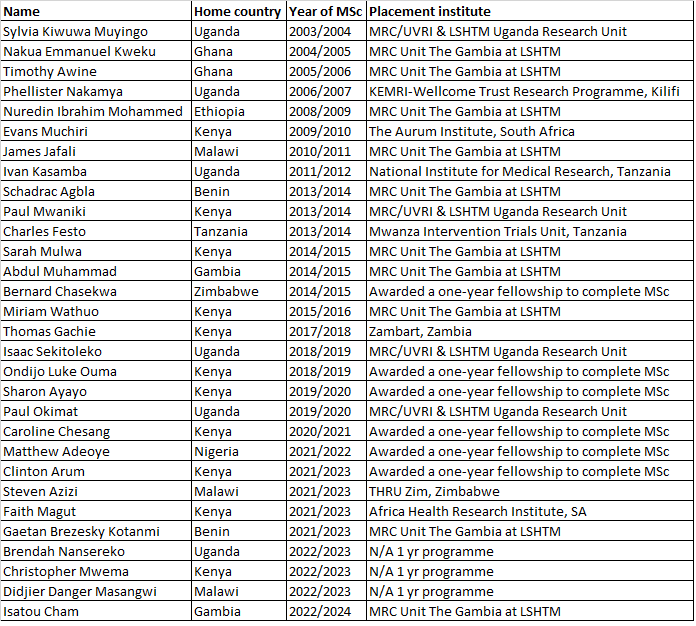
Testimonies
Luke Ouma was awarded a one-year Fellowship in 2018 to complete the Medical Statistics MSc at LSHTM, he went on to study for a PhD at Newcastle University. Watch Luke discuss his time completing the Fellowship.
Sharon Ayayo was awarded a one-year Fellowship in 2019 to complete the Medical Statistics MSc at LSHTM, she went on to accept a Research Assistant position at Cardiff University. Read about Sharon's experiences.
Updates on past fellows’ progress
- Schadrac Agbla (2013-2015) Schadrac was awarded a UK ESRC studentship to undertake a PhD in Biostatistics at LSHTM after completion of his fellowship. Following this, Schadrac was awarded an MRC early career development fellowship to do postdoctoral research at the University of Liverpool. Schadrac has been working part-time as a research fellow in Medical Statistics at LSHTM since 2018 and is also an external lecturer at the Institute of Tropical Medicine and International Health, Charité-University Berlin (Germany) and the Laboratoire de Biomathématiques et d’Estimations Forestières, University of Abomey-Calavi (Benin).
- Charles Festo (2013-2015) Charles is currently working for Ifakara Health Institute (IHI) in Tanzania as a research scientist. Charles is also involved in teaching on the MSc - Public Health Research program at Nelson Mandela African Institute of Science and Technology in Tanzania.
- James Jafali (2010-2012) James successfully completed a PhD in Bioinformatics at the University of Edinburgh (2018) and currently works in Malawi at the Malawi-Liverpool-Wellcome Trust (MLW) as a post-doctoral data scientist.
- Paul Mwaniki (2013-2015) Paul is currently a third year PhD student based at KEMRI-Wellcome Trust, Kenya and registered at the University of Nairobi. His doctoral research investigates the use of large data-sets from high-income settings to improve Machine Learning (predictive) models developed from smaller data-sets available in low-income settings.
(Note to fellows: to update any of the above info please contact ISEG@lshtm.ac.uk)
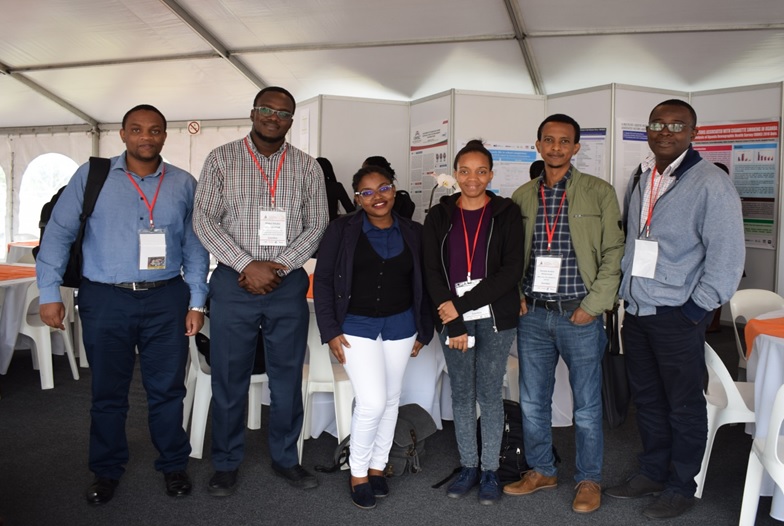
ISEG Fellows at IBS-SUSAN-SSACAB 2019, Cape Town, South Africa. (from left to right - Paul Mwaniki, Abdul Muhammad, Patience Nyakato, Miriam Wathuo, Nuredin Mohammed, Emmanuel Nakua)
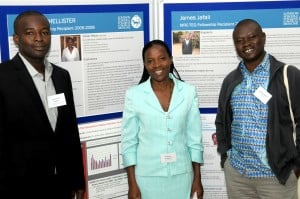
ISEG Fellows at the Group’s 40th Symposium (from left to right: Emmanuel Nakua, Phellister Nakamya and Tim Awine).
ISEG ENTRANT Fellowship
The ISEG ENTRANT fellowship scheme will educate and mentor 15 high-calibre African epidemiologists working in the public health sector in East and Southern Africa, building on a proven model through which 24 African medical statisticians have been trained at the London School of Hygiene & Tropical Medicine (LSHTM) since 2003.
LSHTM has agreed a full fee waiver for fellows on their flagship MSc in Epidemiology. Fellows will select modules relevant to their interests, for example on epidemiology and control of communicable diseases, and modelling and dynamics of infectious diseases, and conduct a three-month research project in their home country. They will undertake multi-disciplinary learning specifically on pandemics, through an online LSHTM short course led by members of the UK Public Health Rapid Support Team, who have international expertise in operational outbreak response and research.
Each fellow will be matched to two mentors, to guide them whilst they undertake the MSc in Epidemiology, the short course on pandemics, a three-month MSc research project in their home country, and dissemination of project results to in-country colleagues and collaborators. The steering committee will facilitate regular meetings, networking events and online discussion, linking with complementary initiatives. Dissemination activities will be conducted to encourage cascading of knowledge to wider networks, enabling longer-term sustainability of the programme.
| Name | Home Country |
| Veronica Moshokgo | Botswana |
| Kwana Lechiile | Botswana |
| Tseyon Tirfe | Ethiopia |
| Jabir Aliye Abdulahi | Ethiopia |
| George Kasera | Kenya |
| Mary Njoroge | Kenya |
| Isaac Egesa | Kenya |
| Akili Mawazo | Tanzania |
| Fredrick Mwita | Tanzania |
| Monica Mtei | Tanzania |
| Ilona Kakai | Uganda |
| Christopher Baleke | Uganda |
| Amanda Wanyana | Uganda |
| Sarah Nyangu | Zambia |
| Gerald Chongo | Zambia |
Recent updates
Events
Newsletter
Contact us
Our mission is to conduct research on the epidemiology and control of diseases of major public health importance in low and middle countries. We initiate epidemiological research and provide epidemiological and statistical expertise for research projects in resource-poor settings. We focus primarily on design and analysis, conducting rigorously designed intervention studies, including randomised controlled trials (RCTs) to identify effective interventions against these diseases and (evaluating strategies to implement such interventions. Our research is collaborative, and we have strong links with clinical epidemiologists, social scientists, and health economists.
Global partnerships and projects
We are in the midst of developing an interactive map of our current projects and partnerships. You are welcome to view our last map to see key information about each project. To magnify any given area or project, please hover your mouse over the markers.
For any more information about any of the projects, please email ISEG@lshtm.ac.uk.
Main research themes
- Malaria
Our group has an expanding research programme addressing key challenges in malaria control and elimination. This work focuses on malaria prevention through new approaches in vector control, vaccine evaluation and chemoprevention, and on novel approaches for malaria surveillance.
- We are engaged in trials evaluating new generation long lasting insecticidal mosquito nets that meet the challenge of insecticide resistance, and novel malaria vector control tools, such as attractive targeted sugar baits and house improvements through eaves tubes.
- We carry out large scale studies and evaluations of seasonal malaria chemoprevention (SMC), now deployed at scale in the Sahel region of Africa. We also evaluate seasonal use of the RTS,S malaria vaccine as an alternative to or combined with SMC.
- We are involved in studies on the epidemiology, surveillance, and elimination of malaria in low transmission settings, including the development of serological approaches to measure transmission and the evaluation of elimination strategies.
In our work, we collaborate closely with scientists in the UK and malaria endemic countries, with international agencies, national malaria control programmes and other implementing partners.
Key Publications
Cissé B, Ba EH, Sokhna C, JL ND, Gomis JF, Dial Y, Pitt C, Ndiaye M, Cairns M, Faye E, M ND, Lo A, Tine R, Faye S, Faye B, Sy O, Konate L, Kouevijdin E, Flach C, Faye O, Trape JF, Sutherland C, Fall FB, Thior PM, Faye OK, Greenwood B, Gaye O, Milligan P. Effectiveness of seasonal malaria chemoprevention in children under ten years of age in Senegal: A stepped-wedge cluster-randomised trial. PLoS Medicine, 13(11): e1002175.
West PA, Protopopoff N, Wright A, Kivaju Z, Tigererwa R, Mosha F, Kisinza W, Rowland M, Kleinschmidt I. (2014). Indoor residual house spraying in combination with insecticide treated nets compared to insecticide treated nets alone for protection against malaria: Results of a cluster randomised trial in Tanzania. PLoS Medicine, 11(4): e1001630.
Staff working on malaria:

Neal Alexander
John Bradley
Paul Milligan
Joanna Schellenberg
Peter Smith- HIV and sexual health
Our HIV and sexual health research priorities for the next 5 years focus largely on the UNAIDS 90-90-90 targets that, by 2020, 90% of those living with HIV know their status, 90% of known HIV-positive individuals receive sustained ART, and 90% of individuals on ART have durable viral suppression. Our projects include:
- Large-scale intervention studies to improve uptake of HIV testing, and treatment for prevention: We lead the HPTN 071 (PopART) trial in South Africa and Zambia, evaluating the impact on HIV incidence of a combination prevention intervention, and lead the epidemiological research for the UNITAID STAR project – the largest evaluation of HIV self-testing (HIVST) in Africa to date.
- HIV and sexual health among adolescents and young people: Adolescents fare more poorly than adults in achieving the UNAIDS goals. We are evaluating strategies to help increase the proportion of young people who are aware of their status, link to care and achieve viral suppression – for example through structured support home visits by trained lay workers.
- HIV prevention and treatment among key vulnerable populations: Key populations continue to have high HIV and STI prevalence in many settings. We are leading a study looking at the association of hormonal contraception and bacterial vaginosis among women at high risk in Kampala, Uganda, and studies on HIV risk factors among fishing communities on Lake Victoria.
- Improving health care systems to respond to HIV: The sustainability of HIV treatment is increasingly important due to improved ART-related survival. We are expanding our focus on treatment of co-morbidities including integration of care for HIV with NCD and mental health disorders in Zimbabwe, Uganda and Tanzania.
Key Publications
d'Elbée M, Indravudh PP, Mwenge L, Kumwenda MM, Simwinga M, Choko AT, Hensen B, Neuman M, Ong JJ, Sibanda EL, Johnson CC, Hatzold K, Cowan FM, Ayles H, Corbett EL & Terris-Prestholt F. (2018). Preferences for linkage to HIV care services following a reactive self-test: discrete choice experiments in Malawi and Zambia. AIDS 32(14): 20143-2049.
Simms V, Rylance S, Bandason T, Dauya E, McHugh G, Munyati S, Mujuru H, Rowland-Jones SL, Weiss HA & Ferrand RA. CD4+ cell count recovery following initiation of HIV antiretroviral therapy in older childhood and adolescence. AIDS 32(14): 1977-1982.
Kelly H, Faust H, Chikandiwa A, Ngou J, Weiss HA, Sgondy M, Dillner J, Delany-Moretlwe S & Mayaud P. (2018). Human Papillomavirus Serology Among Women Living With HIV: Type-Specific Seroprevalence, Seroconversion, and Risk of Cervical Reinfection. Journal of Infectious Diseases 14, 218(6): 927-936.
Torres-Rueda S, Wambura M, Weiss HA, Plotkin M, Kripke K, Chilongani J, Mahler H, Kuringe E, Makokha M, Hellar A, Schutte C, Kazaura KJ, Simbeye D, Mshana G, Larke N, Lija G, Changalucha J, Vassall A, Hayes R, Grund JM &Terris-Prestholt F. Cost and Cost-Effectiveness of a Demand Creation Intervention to Increase Uptake of Voluntary Medical Male Circumcision in Tanzania: Spending More to Spend Less. Journal of Acquired Immune Deficiency Syndromes 1, 78(3): 291-299.
Sabapathy K, Mulubwa C, Mathema H, Mubekapi-Musadaidzwa C, Schaap A, Hoddinott G, Hargreaves J, Floyd S, Ayles H, Hayes R. & HPTN 071 (PopART) Study Team. (2018). Is home-based HIV testing universally acceptable? Findings from a case-control study nested within the HPTN 071 (PopART) trial. Tropical Medicine & International Health 23(6): 678-690.
Ferrand RA, Simms V, Dauya E, Bandason T, Mchugh G, Mujuru H, Chonzi P, Busza J, Kranzer K, Munyati S, Weiss HA & Hayes RJ. The effect of community-based support for caregivers on the risk of virological failure in children and adolescents with HIV in Harare, Zimbabwe (ZENITH): an open-label, randomised controlled trial. The Lancet Child & Adolescent Health 1(3): 175-183.
Staff working on HIV and sexual health:
Theme Leader 

Helen Weiss Richard Hayes Kathy Baisley
John Bradley
Aoife Doyle
Katherine Fielding
Sian Floyd
Chris Grundy
Christian Hansen
Richard Hayes
David MacLeod
Melissa Neuman
Kalpana Sabapathy
Victoria Simms
Emily Webb- Tuberculosis and pneumococcal disease
The TB research conducted by ISEG consists of a broad range of studies including large-scale trials of treatment strategies for patients co-infected with TB and HIV to reduce mortality, studies to assess how new TB diagnostics can improve outcomes among TB suspects and patients, and the effect of earlier initiation of antiretroviral therapy (ART) in HIV-positive individuals on the incidence and prevalence of TB. Through its role as the Biostatistics Core of the Bill and Melinda Gates Foundation-funded Consortium to Respond Effectively to the AIDS and TB Epidemics (CREATE) programme, ISEG was pivotal to the recent successful completion of two major cluster RCTs of interventions to control TB in HIV endemic settings. Results of these trials, the ZAMSTAR and Thibela TB studies, were presented at international meetings in 2011 and 2012 and published in peer-reviewed journals. We presented the findings of the OFLOTUB study, a Phase III study of a TB treatment-shortening regimen for drug sensitive TB, at an international meeting in late 2013, which is currently being written up for publication. The Group’s work on the RAFA project has been extended into 2014 and we hope to have initial results available in early 2015. The work of the Group continues to expand with a new 6-year cluster RCT soon to start in Lima, Peru. This is a socioeconomic intervention aiming to reduce further TB and mortality in TB-affected households.
Key Publications
Churchyard GJ, Fielding KL, Lewis JJ, Coetzee L, Corbett EL, Godfrey-Faussett P, Hayes RJ, Chaisson RE, Grant AD, Thibela TB Study Team (2014) A trial of mass isoniazid preventive therapy for tuberculosis control. The New England Journal of Medicine, 370(4): 301-10. ISSN 0028-4793 DOI: 10.1056/NEJMoa1214289
Ayles H, Muyoyeta M, Du Toit E, Schaap A, Floyd S, Simwinga M, Shanaube K, Chishinga N, Bond V, Dunbar R, De Haas P, James A, Gey van Pittius NC, Claassens M, Fielding K, Fenty J, Sismanidis C, Hayes RJ, Beyers N, Godfrey-Faussett P; ZAMSTAR team (2013) Effect of household and community interventions on the burden of tuberculosis in southern Africa: the ZAMSTAR community-randomised trial. Lancet 382(9899):1183-94. doi: 10.1016/S0140-6736(13)61131-9.
Staff working on Tuberculosis and pneumococcal disease:
Theme Leader 
Katherine Fielding Kathy Baisley
Tansy Edwards
Sian Floyd
Daniel Grint
Richard Hayes
Jennifer Thompson
Emily Webb- Emerging and neglected diseases (END)
The Emerging and Neglected Diseases theme encompasses significant research activity on neglected tropical diseases (NTDs), mental health, eye health, and disease outbreaks. Priorities for the next five years for each of these research areas are outlined below:
Neglected tropical diseases: Following the WHO roadmap, our focus will be primarily on large-scale intervention studies for NTD control and elimination. These include a dose-ranging trial of praziquantel treatment of schistosomiasis in pre-school aged children in Uganda, and a trial of entomological interventions against dengue fever in Malaysia.
Mental health disorders: Our work in this area focuses in particular on adolescents, and on integration with HIV treatment, evaluating effectiveness of interventions through large-scale trials. ISEG is heavily involved in continued evaluation of the “Friendship Bench” (a lay-health worker delivered psychological intervention shown to effectively treat common mental disorders among adults attending primary care). We are also working on the IMPRESS trial, evaluating a community-based model in addition to facility-based for lay-counsellor treatment of depression in India.
Eye health: 80% of visual impairment is avoidable. In ISEG, we focus on eye health in relation to both infectious and non-communicable disease agents. Planned work includes evaluation of the impact of a package of interventions on uptake of eye care services among patients with diabetes, and a CRT to evaluate strengthening prospects for trachoma elimination through enhancing Antibiotic, Facial Cleanliness and Environmental Improvement measures. We will also continue to collaborate on studies investigating the implementation of smartphone-guided eye care (PEEK), including a CRT to evaluate effectiveness for screening for visual impairment in schools in Kenya.
Disease outbreaks: During the 2014 Ebola epidemic, ISEG demonstrated its capacity, capability and preparedness to respond to a need for scientifically rigorous research during rapidly emerging epidemics with a leading role in treatment and vaccine trials. We will continue to provide rapid-response expertise in future outbreaks with the DFID-funded, LSHTM-based, UK Public Health Rapid Support Team, and are also part of the ZikAlliance and ZikaPLAN Consortia.
Key Publications:
Sanya RE, Nkurunungi G, Hoek Spaans R, Nampijja M, O'Hara G, Kizindo R, Oduru G, Kabuubi Nakawungu P, Niwagaba E, Abayo E, Kabagenyi J, Zziwa C, Nakazibwe E, Tumusiime J, Kaweesa J, Muwonge Kakooza F, Akello M, Lubyayi L, Verweij J, Nash S, van Ree R, Mpairwe H, Tukahebwa E, Webb EL, Elliott AM & LaVIISWA trial team. (2018). The impact of intensive versus standard anthelminthic treatment on allergy-related outcomes, helminth infection intensity and helminth-related morbidity in Lake Victoria fishing communities, Uganda: results from the LaVIISWA cluster randomised trial. Clinical Infectious Diseases: doi: 10.1093/cid/ciy761.
Rono HK, Bastawrous A, Macleod D, Waniala E, Di Tanna GL, Weiss HA & Burton MJ. (2018). Smartphone-based screening for visual impairment in Kenyan school children: A cluster randomised controlled trial. The Lancet Global Health, 6(8): e924-932. doi: 10.1016/S2214-109X(18)30244-4.
Nadkarni A, Weobong B, Weiss HA, McCambridge J, Bhat B, Katti B, Murthy P, King M, McDaid D, Park AL, Wilson GT, Kirkwood B, Fairburn CG, Velleman R & Patel V. (2017). Counselling for Alcohol Problems (CAP), a lay counsellor-delivered brief psychological treatment for harmful drinking in men, in primary care in India: a randomised controlled trial. The Lancet: 389(10065):186-195.
van Griensven J, Edwards T, de Lamballerie X, Semple MG, Gallian P, Baize S, Horby PW, Raoul H, Magassouba N, Antierens A, Lomas C, Faye O, Sall AA, Fransen K, Buyze J, Ravinetto R, Tiberghien P, Claeys Y, De Crop M, Lynen L, Bah EI, Smith PG, Delamou A, De Weggheleire A, Haba N & Ebola-Tx Consortium. (2016). Evaluation of Convalescent Plasma for Ebola Virus Disease in Guinea. New England Journal of Medicine: 7,374(1):33-42. doi: 10.1056/NEJMoa1511812.
Staff working on END:
Theme Leader 

Emily Webb Tansy Edwards Neal Alexander
Philip Ayieko
Christian Bottomley
John Bradley
Chris Grundy
Christian Hansen
Min Kim
David MacLeod
Victoria Simms
Peter Smith
Helen Weiss
Cross-cutting themes
- Adolescent health
The number of adolescents and young people is at an all-time high globally and is projected to increase in the coming decades, especially in sub-Saharan Africa. The age group 10-24 years is a transitional period of critical importance for several of our disease themes - including HIV where over 1/3 of new infections are in adolescents and young people, and mental health, as over half of mental health problems begin during adolescents. The Group is now expanding to work on broader issues of adolescent health, including improvement of menstrual management, evaluation of interventions to increase uptake of modern contraceptives in adolescent girls, and strategies to improve detection and counselling for behaviours that impact on future health (such as alcohol, smoking and sexual behaviour).
- Non-communicable diseases
Non-communicable diseases, including mental health disorders, are responsible for an increasing burden of disease in Africa and other low-resource settings. Our work focuses largely on defining the burden of these conditions and evaluating programmatic interventions such as task-shifting, to improve diagnosis and treatment.
Current studies that ISEG are involved in include:
- a programme of health systems research on the control of non-communicable diseases in Tanzania and Uganda
- collaboration with the Malawi Epidemiology and Intervention Research Unit (MEIRU) to examine the prevalence of, and risk factors for, hypertension, diabetes and hyperlipidaemia in rural and urban Malawi
- a series of randomised controlled trials evaluating psychological interventions delivered by lay health workers in India and Pakistan
Key Publications
Nyirenda MJ, Amberbir A, Jaffar S. Understanding local Determinants of non-communicable diseases in sub-Sahara Africa. BMC Medicine (2014) in press.
Chatterjee S, Naik S, John S, Dabholkar H, Balaji M, Koschorke M, Varghese M, Thara R, Weiss HA, Williams P, Patel V, Thornicroft G. Effectiveness of a community-based intervention for people with schizophrenia and their caregivers in India: the COPSI randomized controlled trial. Lancet (2014) in press.
Jaffar S, Amberbir A, Kayuni N, Musicha C, Nyirenda M. Scaling up testing services for non-communicable diseases in Africa: priorities for implementation research. Trop Med Int Health. (2013) Sep 4.
Atun R, Jaffar S, Nishtar S, Knaul FM, Barreto ML, Nyirenda M, Banatvala N, Piot P. Improving responsiveness of health systems to non-communicable diseases. Lancet. (2013);381:690-7.
Ebrahim S, Pearce N, Smeeth L, Casas JP, Jaffar S, Piot P. Tackling non-communicable diseases in low- and middle-income countries: is the evidence from high-income countries all we need? PLoS Med. (2013);10(1):e1001377.
Staff working on Non-communicable Diseases and Mental Health:
- Methodology
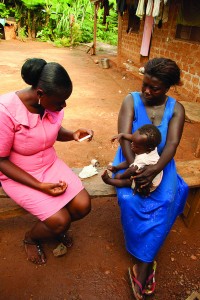
Community health worker waits for rapid diagnostic test results on baby in Takorasi, Ghana. © LSHTM.
One of this theme's objectives is to develop novel study designs and statistical and epidemiological methods, to facilitate interventions against within out priority diseases. Our ideas are motivated by problems we have found on the ground, and facilitated by the many and varied datasets we have helped generate. The major activity is mathematical modelling of HIV/AIDS, malaria, TB and pneumococcal pneumonia. These studies are designed to supplement the empirical data and increase our understanding of the determinants of disease, explore the effects of alternative interventions in different population settings and raise future research hypotheses.
We publish methodological papers in three main areas:
- Randomised trial and other study designs, including endpoint selection, with emphasis on parasitological and entomological outcomes
- Causal inference, which seeks to estimate the strengths of relationships based on models of dependence
- Survey design and behavioural measurement, motivated by studies of HIV and other STIs
Key Publications
Wolbers M, Kleinschmidt I, Simmons CP, Donnelly CA (2012) Considerations in the design of clinical trials to test novel entomological approaches to dengue control. PLoS Negl Trop Dis 6(11):e1937. doi: 10.1371/journal.pntd.0001937.
Alexander N (2012) Analysis of parasite and other skewed counts. Trop Med Int Health 17:684-693. doi: 10.1111/j.1365-3156.2012.02987
Daniel RM, Kenward MG, Cousens SN, De Stavola BL (2012) Using causal diagrams to guide analysis in missing data problems. Stat Meth Med Res 21(3):243-56. doi: 10.1177/0962280210394469.
McCreesh N, Frost SD, Seeley J, Katongole J, Tarsh MN, Ndunguse R, Jichi F, Lunel NL, Maher D, Johnston LG, Sonnenberg P, Copas AJ, Hayes RJ, White RG (2012) Evaluation of respondent-driven sampling. Epidemiology 23(1):138-47. doi: 10.1097/EDE.0b013e31823ac17c
Staff working on methodology:
Theme Leader 
Dr Neal Alexander
Recent updates
Events
Newsletter
Contact us
Courses available at LSHTM
ISEG members teach on several Masters courses at LSHTM. More information on these courses, including distance learning options, can be found on LSHTM’s central website through the following links:
Epidemiology by Distance Learning
Clinical Trials by Distance Learning
Short Courses
Advanced Course in Epidemiological Analysis
Causal Inference in Epidemiology: Recent Methodological Developments
Design & Analysis of Cluster Randomised and Stepped Wedge Trials
Overseas Courses
ISEG is involved in the organisation and teaching of several overseas training courses in epidemiology, statistics and research methods for local scientists. These courses are organised in collaboration with our affiliated units across Africa.
Practical Epidemiology - Using Epidemiology to Support Primary Health Care
An updated version of Practical Epidemiology, by Patrick Vaughan (previously head of the International Statistics & Epidemiology Group), Cesar Victora, and A Mushtaque R Chowdhury is available here in both Open Access and paperback formats.

Adolescents Living Our Best Lives: HIV and Beyond
This is the theme of this year’s International Workshop on HIV & Adolescence, which will take place on 29-30 September and 6-7 October. Details from the conference organisers:
Have you recently heard a young person talk about "living their best lives"? That is what we are wanting to explore during this year’s international workshop. In previous workshops, we have focused on a number of areas that speak to the HIV-specific needs of adolescents living with and affected by HIV. This workshop aims to look at the fuller lives of adolescents, including their mental health, experiences of violence, the social and economic contexts they grapple with, how they use digital technology to navigate the world, and how they take control of their own health and lives. These topics have an impact on the ability of adolescents to lead healthy lives. Join us to hear from experts, many of whom are young people, to learn about tried and tested initiatives and strategies that support adolescents to be healthy and live their best lives!
Submit an abstract here - Deadline: Friday, 30 July 2021
Abstract Topics
- Developing Resilience: Mental Health and Psychosocial Support for Adolescents
- Digital Technology: Connecting, Informing, and Delivering Adolescent SRH and HIV Services
- Into the Future: Biomedical HIV Prevention, HIV Treatment, and the Cure
- Key Populations
- Self-Care: Empowering Adolescents to Take Charge of Their SRH and HIV Care
- Staying Safe: Addressing Gender-Based Violence and Violence in the Home
- Social Protection and Economic Interventions: Driving Better HIV and SRH Outcomes for Adolescents
In addition to these topics, the following two topics are cross-cutting for all sessions.
- COVID-19 & Adolescence
- Adolescence-Friendly Health Services
2021 ISEG Fellowship
We are now accepting applications for the 2021 ISEG Fellowship. Please visit the Fellowship page for information about how to apply. Applications should be made via the online portal.
Closing date for applications: Sunday 25 April
Former ISEG Fellow, Sharon Ayayo shares her experiences completing her Master's degree in Medical Statistics
Great things about a master’s degree in Medical Statistics. My Experience.
They say Master’s students are usually more mature, more wise, more determined, more hardworking and better at multitasking. Is this true? Of course, it is, however, it is assumed that postgraduate students never have time to do anything else but study. Now this is definitely not true. In fact, it’s just all about the balance. Being a postgraduate student is actually more fun than people think it is. This is something I came to realize once I started my course. Even though there were some challenges especially due to the covid-19 pandemic where we had to transition from face-to-face learning to attending online classes on our beds in our pyjamas, generally I enjoyed my studies! Here is why:
1. Just being a Master’s student
Studying at postgraduate level is no joke. The fact that not everyone decides to do a Master’s, especially in my country is already evident in itself. That it is simply not the easiest thing. For me being a Medical Statistics student at LSHTM was truly an accomplishment as this has been my dream ever since! Being my first time abroad, it was a fascinating experience to socialize with people from all over the world, learn new cultures, try different amazing cuisines and not to forget adapting to the cold weather.
2. Ability To specialize
By studying a postgraduate degree, you have already mastered *pun intended* what you specifically want to do in life; unlike at undergraduate level, where most times, people are testing the waters with their career choices. In fact, this was the case for me as when I graduated for my undergraduate degree in Statistics, I wasn’t exactly sure of my career path. Thank goodness for postgraduate study as, I realized that Medical Statistics was my suitable career choice. Additionally, with my degree in Medical Statistics, I have been able to learn specific important topics within just one year.
3. Learning how to make the most of your time
It’s only one year. One year to do all you can. One year to be all you can. You only realize time flies when that one-year sprints past you. Being a Medical Statistics student has taught me how to balance a lot of things at once. Especially for international students like me, you want to make the most of your opportunity to study abroad. I am truly grateful for the ISEG Fellowship programme for enabling me to do all this.
What I find appealing about the ISEG Fellowship programme is that, besides offering a full scholarship for your Master’s degree in Medical Statistics, they also provide a one year placement at their partner centres in Africa which enables you to gain the relevant work experience as a statistician thereby developing more in your career. In addition to that, they also offer capacity strengthening and training opportunities to their fellows. So if you are wishing to apply for this programme, my advice for you would be simple, believe in yourselves wholly and completely. Undoubtedly and unequivocally. If you don’t how can you expect someone else to? Trust me no one will be there to do it for you. Have your own back, no one is going to push you and drive you like you can and should for yourself. So, get up, shut up and chase your dreams. This is the best programme that you will ever find!
Turning houses into ‘lethal mosquito lures’ nearly halves incidence of malaria in children in African trial
A new type of malaria intervention that involves turning houses into lethal lures has significantly reduced incidence of malaria among children in Côte d’Ivoire, Africa, according to new research published in The Lancet. The study was led by Penn State, the London School of Hygiene & Tropical Medicine, Institut Pierre Richet, Côte d’Ivoire and the Liverpool School of Tropical Medicine, and was funded by the Bill & Melinda Gates Foundation. Study Co-PI and ISEG member Jackie Cook told us “These results are very exciting. Bed nets have been the standard malaria intervention for decades and have resulted in a large reduction in disease but there are still countries, such as Cote d’Ivoire, where malaria is still a huge problem. New tools to control the disease are urgently needed. Our trial has shown that Eave Tubes combined with house screening can reduce malaria in children by 40%, and even more in villages where we had higher coverage of the intervention. This intervention could potentially save a huge number of lives if it was scaled up”. Read the full story here.
£4.2m funding boost to improve menstrual health in Ugandan schools
A new study, led by Helen Weiss, Professor of Epidemiology and Director of ISEG, in partnership with the MRC/UVRI & LSHTM Uganda Research Unit, WoMena Uganda, and UCL, aims to improve teenage girls’ ability to manage their menstruation with confidence, and therefore improve their educational performance, mental health and quality of life.
Read the full story here
We’re changing our name
Prompted by the decolonising global health movement we are changing the name of our group to remove the word “Tropical” and create a name that more accurately reflects our expertise. A working group comprising current staff, and students who were previously awarded an MSc training fellowship by the group, undertook a thorough consultative process to discuss a new name and new strapline. With immediate effect our new name is the MRC International Statistics and Epidemiology Group (abbreviated to ISEG). This will be accompanied by a strapline “Collaborating with international research partners to improve health in low and middle-income countries”, which reflects both our geographical focus and our commitment to collaborative research.
Webinar series: Data Collection in A Covid-19 Era.
The EPH project on remote data collection team, which includes the Director of ISEG, Professor Helen Weiss, recently held a webinar series exploring how we can design methods and navigate challenges during the Covid-19 pandemic. You can view the recordings below.
Session one: Ethical issues with data collection in a COVID-19 era
Session two: Qualitative data collection in a COVID-19 era: methods, challenges and opportunities
Session three: Quantitative data collection in a COVID-19 era: methods, challenges and opportunities
Helen Weiss and Pontiano Kaleebu elected as Fellows of the Academy of Medical Sciences

Professor Helen Weiss and Professor Pontiano Kaleebu have been elected as Fellows of the Academy of Medical Sciences. Find out more here
LSHTM pays tribute to Professor Gita Ramjee

It was with great sadness that we learned of the death of Professor Gita Ramjee, Honorary Professor in the Faculty of Epidemiology and Population Health at LSHTM on Tuesday 31 March. Read the full tribute here
Introducing the E-Value: Thursday 13th Feb 2020, 17:30, John Snow B
Join us on Thursday 13th Feb at 17:30 for a seminar on the E-Value presented by Tyler J VanderWeele. Seminar open to all.
Tyler J. VanderWeele, Ph.D., is the John L. Loeb and Frances Lehman Loeb Professor of Epidemiology in the Departments of Epidemiology and Biostatistics at the Harvard T.H. Chan School of Public Health, Director of the Human Flourishing Program and Co-Director of the Initiative on Health, Religion and spirituality at Harvard University, and 2019-2020 Eastman Visiting Professor at the University of Oxford. His research concerns methodology for distinguishing between association and causation in observational studies, and the use of statistical and counterfactual ideas to formalize and advance epidemiologic theory and methods. His empirical research spans psychiatric, perinatal, and social epidemiology; the science of happiness and flourishing; and the study of religion and health, including both religion and population health and the role of religion and spirituality in end-of-life care. He is the recipient of the 2017 COPSS Presidents' Award from the Committee of Presidents of Statistical Societies.
Feminem Podcast
ISEG Director Prof Helen Weiss features on the Feminem podcast discussing careers in epidemiology, gender equity in leadership and why there aren't more women populating the highest leadership positions in public health.
Ending period poverty by 2030: From research to impact
Thursday 4 July
This meeting, held by the GCRF East and Southern Africa Menstrual Hygiene Research Network will bring together researchers, funders, policy makers and practitioners to discuss how we can use existing evidence to develop and deliver effective menstrual health policies and programmes globally and in the UK to end period poverty by 2030.
Parts of the day will be recorded and a link posted here after the meeting. We’ll be tweeting highlights of the meeting throughout the day using the hashtag #MHMResearch2Impact from our Twitter account @MRCTEG_LSHTM.
Celebrating International Clinical Trials Day 2019 and the PopART Trial
The Clinical Trials Programme by Distance Learning, and the PopART Trial team, at the London School of Hygiene and Tropical Medicine has produced a resource to celebrate International Clinical Trials Day. You can learn about an important trial carried out in Sub-Saharan Africa which “tested the theory that HIV incidence could be dramatically reduced if everyone in a community knows their HIV status, and those positive are effectively treated”.
Through the words of the trial team, and through their inspirational photographs from the field, you can engage with the need for the trial, the methods used in the research, and gain insights into the value and importance of a rigorously conducted trial in changing the evidence base for care.
Field Trials of Health Interventions: a Toolbox - 3rd Edition
The third edition of Field Trials of Health Interventions: a Toolbox can now be accessed online.
Seminar: Impact of universal test-and-treat on HIV incidence in Zambia and South Africa: Results of the HPTN 071 (PopART) trial
PopART was a cluster-randomised trial carried out in 21 communities in Zambia and the Western Cape of South Africa, and the largest HIV prevention trial ever undertaken. Richard Hayes, who led the trial, will present the primary results of the trial, and discuss the implications of the findings in the context of other trials of universal test-and-treat.
Professor Richard Hayes has been working at the School since 1978, and for much of this period he has headed the MRC International Statistics and Epidemiology Group whose mission is to develop and apply statistical methods in tropical epidemiology and to carry out research on major public health problems of developing countries.
This session will be live-streamed/recorded - accessible only to internal audience.
Speaker
Professor Richard Hayes (LSHTM)
Admission
Open to all, seats available on first come, first served basis.
Contact: Richard Hayes
Venue
LSHTM, Keppel Street
London
WC1E 7HT
United Kingdom
Room
John Snow A Lecture Theatre
Date
Thursday 9 May 2019
Time
12:30 - 13:30
Realizing the potential of HIV self‐testing for Africa: lessons learned from the STAR project
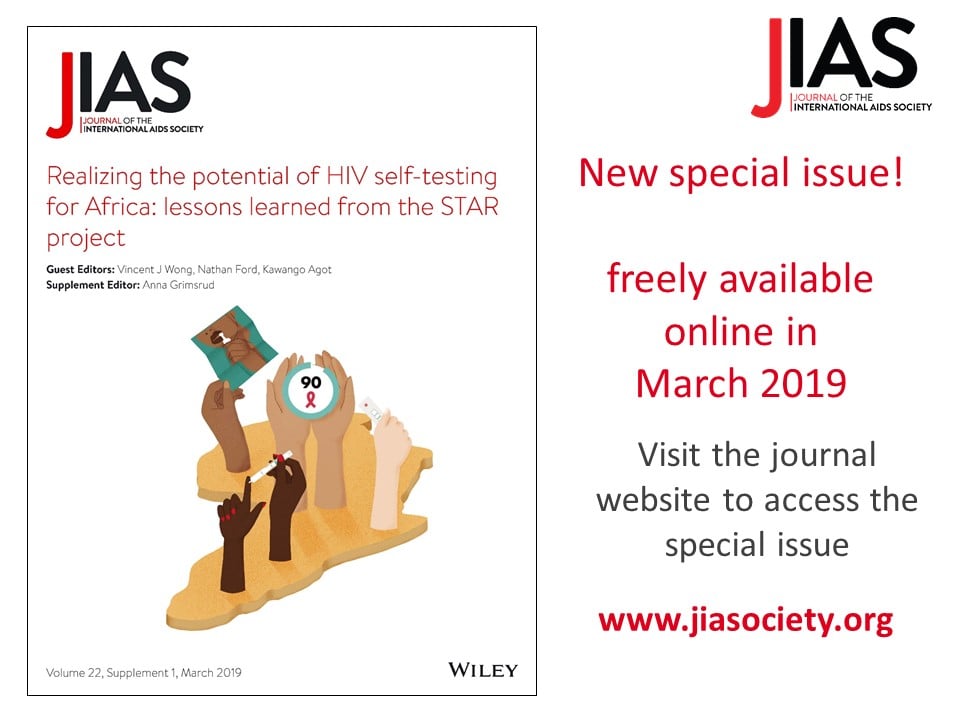
A special issue Open Access edition of the Journal of the International AIDS Society on HIV self-testing, including ISEG authored articles.
Field Trials of Health Interventions: A Toolbox – new 3rd edition now available to download
An updated version of the Field Trials of Health Interventions: A Toolbox, edited by Peter G. Smith, Richard H. Morrow, and David A. Ross is now available for download.
Abstract: Before new interventions are released into disease control programmes, it is essential that they are carefully evaluated in 'field trials'. These may be complex and expensive undertakings, requiring the follow-up of hundreds, or thousands, of individuals, often for long periods. Descriptions of the detailed procedures and methods used in the trials that have been conducted have rarely been published.
A consequence of this, individuals planning such trials have few guidelines available and little access to knowledge accumulated previously, other than their own. In this open-access online guide, practical issues in trial design and conduct are discussed fully and in sufficient detail. It has been compiled by an international group of over 30 authors with direct experience in the design, conduct, and analysis of field trials in low and middle income countries and is based on their accumulated knowledge and experience.
UK patient 'free' of HIV after stem cell treatment - BBC World Service
ISEG member Kalpana Sabapathy speaks on BBC World Service about the 'London patient', HIV remission and the HPTN 071 (PopART) trial.
2019 ISEG Fellowship
We are now accepting applications for the 2019 ISEG Fellowship. Please visit the Fellowship page for information about how to apply. Applications should be made via the online portal.
Closing date for applications: Friday 26 April
Short Course in Design & Analysis of Cluster Randomised and Stepped Wedge Trials
8 – 12 July 2019
Cluster randomised trials and stepped wedge trials are increasingly used to evaluate health and social interventions. These trial designs require specific methods of statistical analysis. This course will provide attendees with a clear understanding of the design and analysis of cluster randomised trials and stepped wedge trials.
This includes the rationale for using these designs, specific design issues, the randomisation process, sample size calculations, analytical methods, ethical considerations, and trial reporting and interpretation. We will include case studies from low-, middle- and high-income settings. Participants will gain practical experience of data analysis using the computer package Stata.
Introductory Course in Epidemiology & Medical Statistics
24 June – 12 July 2019
Our Introductory Course in Epidemiology & Medical Statistics is now open for applications for 2019. The course covers the design and analysis of epidemiological studies, statistical methods in epidemiology, data analysis using Stata software and epidemiological principles of research.
How a bench and a team of grandmothers can tackle depression - BBC Future
18 October 2018
"Zimbabwe is pioneering a groundbreaking mental health programme with stunning results – and the rest of the world is taking note..."
Dixon Chibanda is director of the African Mental Health Research Initiative and an associate professor of psychiatry at the University of Zimbabwe and the London School of Hygiene and Tropical Medicine. He is one of just 12 psychiatrists practising in Zimbabwe – a country of over 16 million. Together with ISEG director Helen Weiss and member Vicky Simms, co-authored a paper on tackling depression in Zimbabwe with grandmothers and benches.
Sequential Trials Symposium
18 September 2018
The Centre for Statistical Methodology and the International Statistics and Epidemiology Group of the London School of Hygiene and Tropical Medicine (LSHTM) held a half day symposium on sequential trials on 26 September 2018. Presentations highlighted recent research and application of these methods, and speakers included Sue Todd (University of Reading), Dominic Magirr (AstraZeneca), Babak Choodari-Oskooei (MRC Clinical Trials Unit at UCL), and Neal Alexander (LSHTM).
Sequential designs are intended to rapidly assess new interventions, particularly when the outcome is rare, and have arguably been under-used in medical research. For example, sequential trials were proposed as a way of ‘getting an answer sooner and cheaper’ for neglected tropical diseases. This meeting concentrated on ‘fully sequential’ trials but group sequential designs were also addressed. In the former, the data are analysed after each patient’s results become available, and the trial is stopped after a pre-specified objective is reached. Hence, the sample size is not fixed in advance. In the group-sequential approach, the sample size is determined conventionally, but the trial may be stopped at one of a small number of interim analyses.
This symposium took place at Birkbeck College in central London. This may be of interest to statisticians and others involved in the design or analysis of trials, whether or not they have previous experience of such.

New horizons for medical statistics and epidemiology in global health
The MRC International Statistics & Epidemiology Group 50th anniversary symposium and celebration
Virtual Symposium - Held on 28th - 30th June 2022
Event summary:
To celebrate our 50th anniversary, the MRC International Statistics and Epidemiology Group (previously the MRC Tropical Epidemiology Group) held an international symposium to discuss research studies addressing the Sustainable Development Goal Target 3.3 of ending the epidemics of HIV, TB, malaria and neglected tropical diseases by 2030.
The MRC ISEG was established in 1971 to undertake epidemiological and statistical research in diseases of major public health importance in low-income settings. At the Symposium we reflected on the contribution of medical statistics and epidemiology to global health over the past 50 years and looked to the future with discussion and debate on strategies to transform capacity in medical statistics and epidemiology globally. Speakers included past ISEG Fellows and students, and current ISEG scientists and collaborators.
The Symposium was hosted by LSHTM and partner institutes in Colombia (CIDEIM), The Gambia (MRC Unit The Gambia at LSHTM), Tanzania (Mwanza Intervention Trials Unit), Uganda (MRC/UVRI and LSHTM Uganda Research Unit), Zambia (Zambart) and Zimbabwe (THRU-Zim).
Please see below for our programme of talks from a range of inspiring speakers and follow the links to watch a recording of each session. We are particularly pleased that Dr Soumya Swaminathan, the chief scientist from the World Health Organization led the 4:15pm session on Tuesday 28th June.
Read Kathy Thomas's blog about the symposium here.
- Pre-Symposium training courses
-
Time Session People 26th May 12:00 - 13:00 Key concepts of cluster randomised trials Chair: John Bradley, MRC ISEG, LSHTM
Speaker: Richard Hayes, MRC ISEG, LSHTM
20th June 12:00 - 13:00 Introduction to adolescent health epidemiology Chair: Jackie Cook, MRC ISEG, LSHTM
Speaker: Aoife Doyle, MRC ISEG, LSHTM
23rd June 12:00 - 13:00 Introduction to outbreak modelling Chair: Melissa Neuman, MRC ISEG, LSHTM
Speakers: David Jeffries and Nuredin Mohammed, MRC Unit The Gambia at LSHTM
- Tuesday 28th June
-
Welcome
Host: MRC ISEG, LSHTM
Time Session People 12.00-12.05 Welcome remarks Liam Smeeth, Director of LSHTM 12.05–12.55 The development of the MRC International Statistics and Epidemiology Group (ISEG) and contributions to global health in the past 50 years Peter Smith, MRC ISEG, LSHTM
12.55-13.00 Break Session 1: Emerging & Neglected Tropical Diseases
Host: MRC/UVRI & LSHTM Uganda Research Unit
Time Session People 13:00-13:05 Welcome Chair: Pontiano Kaleebu
13.05-13.20 Controlled human infection model for testing schistosomiasis vaccines Emmanuella Driciru, MRC/UVRI & LSHTM, Uganda
13:20-13:35 Rift valley fever: development and evaluation of a One Health vaccine Zac Anywaine, MRC/UVRI & LSHTM, Uganda
13:35-13:50 Africa CDC COVID-19 seroprevalence surveys Festo Mazuguni, Africa CDC & MRC ISEG
13:50-14:05 SARS-CoV2 and COVID-19 surveillance in a general population in Uganda Joseph Mugisha, MRC/UVRI & LSHTM, Uganda 14:05-14:20 Discussion Chair: Pontiano Kaleebu 14:20-14:40 Break Host: MRC Unit The Gambia at LSHTM
Time Session People 14:40-14:45 Welcome Chair: Umberto D’Alessandro 14:45-15:05 New approaches to mass drug administration to eliminate malaria Edgard Dabira, MRC Unit The Gambia at LSHTM
15:05-15:25 Seasonal interventions for malaria control Matt Cairns, MRC ISEG LSHTM
15:25-15:45 Effectiveness of dual active ingredient treated nets against malaria in Tanzania Jackie Mosha, NIMR Tanzania
15:45-16:00 Discussion Chair: Umberto D’Alessandro 16:00-16:15 Break Session 3: In conversation with
Host: MRC ISEG, LSHTM
Time Session People 16:15-17:00 In conversation with Dr Soumya Swaminathan, Chief Scientist, WHO: Expanding capacity and shaping epidemiological research to advance global health Dr Soumya Swaminathan, Chief Scientist, WHO - Wednesday 29th June
-
Session 1: Stakeholder survey results
Host: MRC ISEG, LSHTM
Time Session People 12:00-12:50 Capacity in medical statistics and epidemiology in global health research: What is the problem? What are the solutions? Chair: Elizabeth Allen 12:50-13:00 Break Host: Zambart, Zambia
Time Session People 13:00-13:05 Welcome Chair: Helen Ayles 13:05-13:20 What can we learn from a combined TB screening and HIV testing door-to-door community-wide strategy, in settings with a high prevalence of TB/HIV? Thomas Gachie, Zambart, Zambia
13:20-13:35 TB and COVID: What are the links? Kwame Shanaube, Zambart, Zambia
13:35-13:50 Digital adherence technologies to support tuberculosis care in Ethiopia Amare Tadesse, MRC ISEG, LSHTM
13:50-14:05 TB-Practecal: results from a non-inferiority treatment trial for rifampicin-resistant tuberculosis Katherine Fielding, MRC ISEG, LSHTM
14:05-14:20 Discussion Chair: Helen Ayles 14:20-14:40 Break Host: CIDEIM, Colombia
Time Session People 14:40-14:45 Welcome Chair: Neal Alexander 14:45-15:00 Developing and validating the Social Ecology of Occupational Zoonoses (SEOZ) psychometric instrument for the prevention of infections in agricultural settings Jairo Palomares, CIDEIM, Colombia
15:00-15:15 Simulated trials-Assessment of treatment effect in the era of widespread use of active controls Andrew Abaasa, MRC/UVRI & LSHTM, Uganda
15:15-15:30 Gender and intersectionality: Impacts of Artificial Intelligence/digital systems on marginalized groups Sylvia Muyingo, Africa Population & Health Research Center, Kenya
15:30-15:45 Data science in outbreak response Chris Grundy, MRC ISEG, LSHTM
15:45-16:00 Discussion Chair: Neal Alexander - Thursday 30th June
-
Session 1: Discussion
Host: MRC ISEG, LSHTM
Time Session People 12:00-12:50 Increasing capacity in medical statistics and epidemiology in LMICs: What works? Chair: Helen Weiss
Examples from: MRC ISEG, Zambart, DREAMS, THRU, MRC Units
12:50-13:00 Break Host: Mwanza Intervention Trials Unit, Tanzania
Time Session People 13:00-13:05 Welcome Chair: Saidi Kapiga 13.05-13.20 Hypertension in HIV infected
adults: a complex and important problemRobert Peck, MITU, Tanzania
13.20-13.35 From epidemiology to the
integration of care: 10 years of research on the response to chronic diseases in East AfricaBazil Kavishe, MITU, Tanzania
13.35-13.50 Accuracy of blood pressure measurement in Kenya: Implications for controlling the epidemic of cardiovascular disease Anthony Etyang, KEMRI, Kenya
13:50-14:05 Leveraging the HIV care platform to
improve hypertension care using the PRECEDE model: a cluster randomised trial from UgandaJane Kabami, Infectious Disease Research Collaboration, Uganda
14:05-14:20 Discussion Chair: Saidi Kapiga 14:20-14:40 Break Host: The Health Research Unit, Zimbabwe
Time Session People 14:40-14:45 Welcome Chair: Agnes Mahomva 14:45-15:00 Universal test & treat: What have we learnt about ending the HIV epidemic? Richard Hayes, MRC ISEG, LSHTM
15:00-15:20 Beyond HIV: Broadening access to sexual and reproductive health and rights (SRHR) in southern and eastern Africa Maryam Shahmanesh, AHRI & UCL
Catherine Kansiime, MRC/UVRI, Uganda
15:20-15:45 Innovation and Integration for HIV/SRH interventions for young people Chido Dziva Chikwari, THRU & MRC ISEG
Tinashe Mwaturura, THRU, Zimbabwe
Bernadette Hensen, LSHTM
Mwelwa Phiri, Zambart, Zambia
15:45-16:00 Discussion Chair: Agnes Mahomva 16:00-16:15 Break Closing session
Host: MRC ISEG, LSHTM
Time Session People 16:15-17:00 New horizons in medical statistics and epidemiology: Reflections from researchers and funders on how to meaningfully increase capacity Chair: Rashida Ferrand, THRU & LSHTM
Representatives from EDCTP, MRC & other funders
